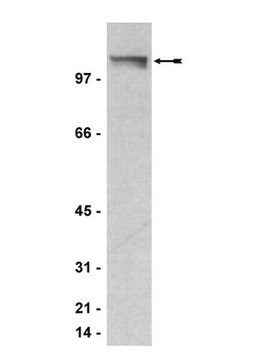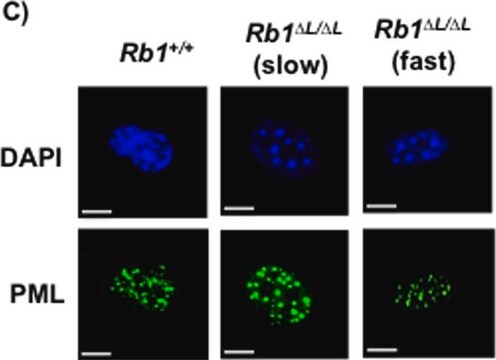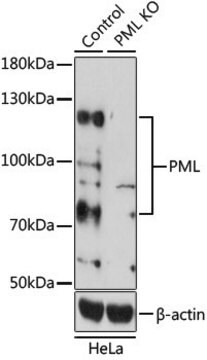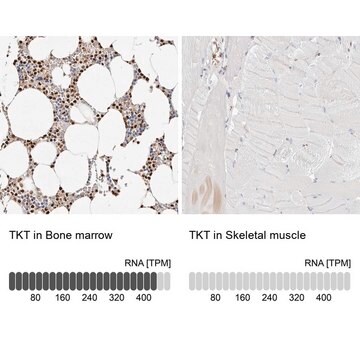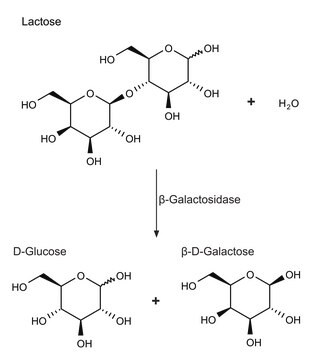추천 제품
생물학적 소스
mouse
결합
unconjugated
항체 형태
purified immunoglobulin
항체 생산 유형
primary antibodies
클론
PML-97, monoclonal
형태
buffered aqueous solution
분자량
antigen ~90 kDa
종 반응성
hamster, human, mouse
기술
immunocytochemistry: suitable
immunoprecipitation (IP): suitable
indirect ELISA: suitable
microarray: suitable
western blot: 1-2 μg/mL using 293T cells expressing recombinant PML3
동형
IgG1
UniProt 수납 번호
배송 상태
dry ice
저장 온도
−20°C
타겟 번역 후 변형
unmodified
유전자 정보
human ... PML(5371)
일반 설명
Monoclonal Anti-PML (mouse IgG1 isotype) is derived from the PML-97 hybridoma produced by the fusion of mouse myeloma cells (NS1 cells) and splenocytes from BALB/c mice immunized with recombinant full-length human PML (promyelocytic leukemia) protein. PML is characterized with cysteine-rich zinc-binding domains (RING), two B-boxes, an adjacent leucine coiled coil forming the RBCC or tripartite motif (TRIM), and a nuclear localization signal (NLS). The RING and B-box are important for the interaction of the PML protein with different proteins. In normal cells, the PML protein is found in nuclear bodies (PML NBs) whereas in acute promyelocytic leukemia (APL) patients, the PML NBs are disrupted and delocalized from PML NBs to nucleus and cytoplasm.
The PML gene is located on the human chromosome at 15q24.1.
특이성
Monoclonal Anti-PML recognizes human, mouse, and hamster PML (about 90 kDa)
면역원
recombinant full-length human PML (promyelocytic leukemia) protein.
애플리케이션
Anti-PML antibody, Mouse monoclonal may be used in:
- enzyme-linked immunosorbent assay (ELISA)
- immunoblotting
- immunoprecipitation
- immunocytochemistry
- indirect immunofluorescence
생화학적/생리학적 작용
A monoclonal antibody to promyelocytic leukemia (PML) is an important tool for studying PML function in normal and cancerous cells. In normal cells, the PML protein and the PML nuclear bodies play a role in different physiological processes such as: growth control, transcription, DNA repair, DNA replication and RNA transport.
물리적 형태
Solution in 0.01 M phosphate buffered saline, pH 7.4, and 15 mM sodium azide.
저장 및 안정성
For continuous use, store at 2–8 °C for up to one month. For extended storage, freeze in working aliquots. Repeated freezing and thawing is not recommended. Storage in frost-free freezers is not recommended. If slight turbidity occurs upon prolonged storage, clarify the solution by centrifugation before use. Working dilutions should be discarded if not used within 12 hours.
면책조항
Unless otherwise stated in our catalog or other company documentation accompanying the product(s), our products are intended for research use only and are not to be used for any other purpose, which includes but is not limited to, unauthorized commercial uses, in vitro diagnostic uses, ex vivo or in vivo therapeutic uses or any type of consumption or application to humans or animals.
Not finding the right product?
Try our 제품 선택기 도구.
Storage Class Code
10 - Combustible liquids
WGK
nwg
Flash Point (°F)
Not applicable
Flash Point (°C)
Not applicable
개인 보호 장비
Eyeshields, Gloves, multi-purpose combination respirator cartridge (US)
시험 성적서(COA)
제품의 로트/배치 번호를 입력하여 시험 성적서(COA)을 검색하십시오. 로트 및 배치 번호는 제품 라벨에 있는 ‘로트’ 또는 ‘배치’라는 용어 뒤에서 찾을 수 있습니다.
Nuclear organization during in vitro differentiation of porcine mesenchymal stem cells (MSCs) into adipocytes
Stachecka J, et al.
Histochemistry and Cell Biology, 149(2), 113-126 (2018)
Pondering the promyelocytic leukemia protein (PML) puzzle: possible functions for PML nuclear bodies
Borden KLB
Molecular and Cellular Biology, 22(15), 5259-5269 (2002)
Jason Koshy et al.
Cancer genetics, 205(10), 537-540 (2012-09-18)
Acute promyelocytic leukemia (APL) is a well-defined subtype of acute myeloid leukemia (AML) specifically characterized by the t(15;17)(q22;q12) translocation. The t(15;17) results in the fusion of the promyelocytic leukemia (PML) and retinoic acid receptor alpha (RARA) genes. Rare cryptic fusions
Wei Zhou et al.
Cell & bioscience, 10(1), 146-146 (2020-12-24)
Increased reactive oxygen species (ROS) production by arsenic treatment in solid tumors showed to be effective to sensitize cancer cells to chemotherapies. Arsenic nano compounds are known to increase the ROS production in solid tumors. In this study we developed
I-Ting Chen et al.
EMBO reports, 22(12), e52254-e52254 (2021-10-12)
Promyelocytic leukemia protein (PML) is a tumor suppressor possessing multiple modes of action, including induction of apoptosis. We unexpectedly find that PML promotes necroptosis in addition to apoptosis, with Pml-/- macrophages being more resistant to TNF-mediated necroptosis than wild-type counterparts
자사의 과학자팀은 생명 과학, 재료 과학, 화학 합성, 크로마토그래피, 분석 및 기타 많은 영역을 포함한 모든 과학 분야에 경험이 있습니다..
고객지원팀으로 연락바랍니다.